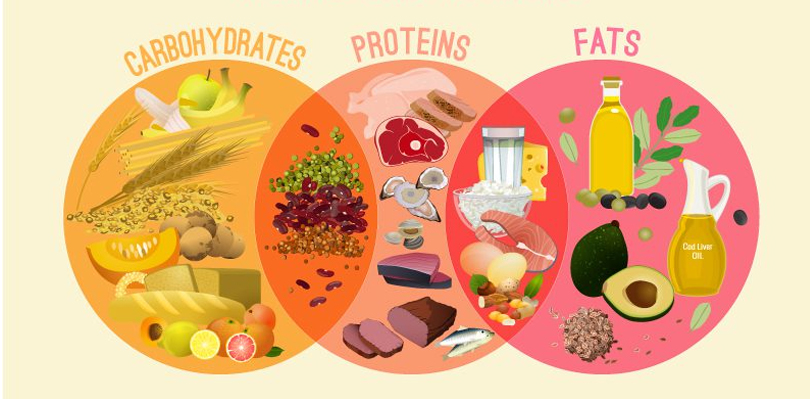Are you ready to unlock the secrets of Macronutrients and take your health and well-being to new heights? Look no further! In this informative and captivating article, we delve into the fascinating world of macronutrients and their undeniable impact on our bodies.
Macronutrients, consisting of carbohydrates, proteins, and fats, are the building blocks of a balanced diet. They provide us with the energy we need to fuel our daily activities, support muscle growth and repair, and regulate essential bodily functions. But their influence goes far beyond mere sustenance.
Join us as we uncover the intricate roles each macronutrient plays in our overall health and explore how their careful balance can optimize weight management, enhance athletic performance, and promote longevity. From the energizing benefits of carbohydrates to the muscle-building properties of proteins and the vital role of healthy fats, we’ll reveal the science-backed insights you need to make informed dietary choices. Prepare to be empowered with knowledge and discover the ultimate power of macronutrients in transforming your life. Let’s embark on this enlightening journey together!
What Are Macronutrients And How They Work
Macronutrients are the essential nutrients required by our bodies in large quantities to sustain life and support various physiological functions. They include carbohydrates, proteins, and fats. Moreover, carbohydrates serve as the primary source of energy, providing fuel for our cells, muscles, and brain. They are found in foods like grains, fruits, and vegetables.
Furthermore, proteins are crucial for the growth, repair, and maintenance of tissues. They play a role in building and repairing muscles, enzymes, hormones, and antibodies. Good sources of protein include meat, fish, dairy, legumes, and nuts. Fats are vital for insulation, protecting organs, and serving as a concentrated energy source. They also aid in nutrient absorption and hormone production. Healthy fats can be found in avocados, olive oil, nuts, and fatty fish. Balancing these macronutrients is essential for maintaining optimal health and supporting our body’s functions.
Benefits Of Macronutrients

Energy Production
Macronutrients, particularly carbohydrates, serve as the primary source of energy for our bodies. When consumed, carbohydrates are broken down into glucose, which fuels our cells and provides the energy needed for daily activities and bodily functions.
Muscle Growth And Repair
Proteins, one of the macronutrients, are essential for building and repairing muscle tissues. They provide the necessary amino acids that support muscle growth, recovery, and maintenance. Adequate protein intake is particularly important for athletes, bodybuilders, and individuals engaged in regular exercise.
Hormone Regulation
Macronutrients play a role in hormone production and regulation. Fats, for instance, are necessary for the synthesis of hormones, including those involved in metabolism, reproductive health, and brain function.
Nutrient Absorption
Fats are crucial for the absorption of fat-soluble vitamins (such as vitamins A, D, E, and K) and other nutrients. They help transport these vitamins from the digestive system into the bloodstream, ensuring their availability for various bodily functions.
Brain Function
Carbohydrates, especially glucose, are the preferred source of energy for the brain. A balanced intake of carbohydrates ensures optimal brain function, including concentration, memory, and cognitive abilities.
Weight Management
A balanced intake of macronutrients is essential for weight management. Proteins and fats contribute to satiety, helping you feel full and satisfied after meals. Including adequate protein and healthy fats in your diet can reduce cravings and prevent overeating.
Heart Health
Choosing healthy fats, such as monounsaturated and polyunsaturated fats found in avocados, nuts, and fish, can promote heart health. These fats have been linked to lower cholesterol levels and a reduced risk of heart disease when consumed in moderation.
Nutritional Balance
Macronutrients provide the foundation for a well-rounded and balanced diet. Consuming the right proportions of carbohydrates, proteins, and fats ensures that your body receives the necessary nutrients for optimal health, including vitamins, minerals, and antioxidants.
By understanding the benefits of macronutrients and incorporating them into your diet in appropriate quantities, you can support your overall well-being, improve athletic performance, and maintain a healthy weight.
Foods You Can Eat For Macronutrients
Quinoa
Quinoa is a versatile grain that is rich in carbohydrates and also provides a good amount of protein. It contains all nine essential amino acids, making it a complete protein source. Quinoa is also high in fiber, minerals, and antioxidants, making it a nutritious choice for macronutrient balance.
Salmon
Salmon is an excellent source of high-quality protein and healthy fats, particularly omega-3 fatty acids. These fatty acids offer numerous health benefits, including reducing inflammation, supporting brain health, and promoting heart health. Additionally, salmon provides essential vitamins and minerals such as vitamin D and selenium.
Greek Yogurt
Greek yogurt is a protein-packed food that also contains carbohydrates and a small amount of healthy fats. It is an excellent source of calcium, which supports bone health, and contains probiotics that promote a healthy gut. Choose plain, unsweetened Greek yogurt to avoid added sugars and enhance its nutritional value.
Avocado
Avocado is a nutrient-dense fruit that is rich in heart-healthy monounsaturated fats. These fats contribute to satiety and provide essential fatty acids. Avocado also offers fiber, vitamins (such as vitamin K, vitamin C, and vitamin E), and minerals (such as potassium and magnesium).
Chicken Breast
Chicken breast is a lean source of protein that is low in fat and carbohydrates. It is versatile, easy to cook, and widely available. Chicken breast contains essential amino acids necessary for muscle growth and repair. Be mindful of the cooking methods to minimize added fats and sodium.
Lentils
Lentils are a legume rich in carbohydrates and protein, making them an excellent plant-based source of macronutrients. They are also high in fiber, which aids digestion and promotes satiety. Lentils provide various vitamins and minerals, including folate, iron, and potassium.
Almonds
Almonds are a nutritious snack that offers a balance of healthy fats, protein, and carbohydrates. They are rich in monounsaturated fats, which have been linked to improved heart health. Almonds are also a good source of fiber, vitamin E, magnesium, and antioxidants.
Incorporating these foods into your diet can help you achieve a well-rounded intake of macronutrients, supporting overall health and nutritional balance. Remember to consider portion sizes and incorporate a variety of foods to meet your specific dietary needs.
Tips And Techniques To Get Macronutrients
Meal Planning
One effective way to ensure you’re getting the right macronutrients is through meal planning. Take some time each week to plan your meals and snacks, considering the balance of carbohydrates, proteins, and fats. This allows you to incorporate a variety of nutrient-dense foods into your diet and make intentional choices based on your macronutrient needs.
Portion Control
Understanding portion sizes is crucial for achieving the right balance of macronutrients. Use measuring cups, a food scale, or visual cues to ensure you’re consuming appropriate amounts of each food group. For example, a portion of protein is typically around the size of your palm, while a portion of carbohydrates can be measured by a cupped hand.
Tracking Apps Or Food Journals
Utilize tracking apps or keep a food journal to monitor your macronutrient intake. These tools can help you become more aware of the composition of your meals and identify any imbalances. They provide valuable insights into your eating habits and can guide you towards making necessary adjustments to meet your macronutrient goals.
Choose Whole Foods
Opt for whole, unprocessed foods as much as possible. Whole foods tend to be nutrient-dense and provide a better balance of macronutrients compared to processed or pre-packaged foods. Incorporate lean proteins, whole grains, fruits, vegetables, and healthy fats into your meals for a well-rounded macronutrient profile.
Seek Professional Guidance
If you’re unsure about your specific macronutrient needs or have dietary restrictions or goals, consider consulting a registered dietitian or nutritionist. These professionals can assess your individual requirements, provide personalized advice, and help you develop a macronutrient plan tailored to your needs and preferences.
Remember, it’s important to approach macronutrient intake in a balanced and individualized manner. Everyone’s nutritional needs vary based on factors such as age, sex, activity level, and overall health. Finding the right balance of macronutrients for your body will contribute to optimal health and well-being.
FAQs
How do macronutrients contribute to weight loss or weight gain?
Macronutrients play a significant role in weight management. The balance and quantity of macronutrients in your diet can influence weight loss or weight gain. Carbohydrates, proteins, and fats all provide energy, but they differ in how they affect satiety and metabolism. A diet higher in protein and fiber-rich carbohydrates can help promote feelings of fullness and support weight loss. On the other hand, consuming excess calories from any macronutrient, including fats, can contribute to weight gain. It’s important to focus on a balanced macronutrient intake and consider overall calorie intake when aiming for weight management.
Can I meet my macronutrient needs on a plant-based or vegetarian diet?
Absolutely! Plant-based and vegetarian diets can provide all the necessary macronutrients when planned thoughtfully. Various plant-based sources can supply proteins, such as legumes, tofu, tempeh, seitan, and plant-based protein powders. Whole grains, fruits, vegetables, and legumes offer carbohydrates, while healthy fats can be found in foods like avocados, nuts, seeds, and plant oils. It may require paying closer attention to ensure adequate intake of certain nutrients like vitamin B12, iron, and omega-3 fatty acids, which are more commonly found in animal products. Consulting a registered dietitian can be beneficial in creating a well-rounded plant-based or vegetarian meal plan.
Should I be tracking my macronutrient intake?
Tracking macronutrient intake can be helpful for certain individuals, especially those with specific goals or dietary restrictions. It allows you to gain awareness of your eating patterns and ensure you’re meeting your macronutrient needs. However, tracking may not be necessary or suitable for everyone. Some individuals may find it restrictive or stressful. If you’re uncertain about your macronutrient needs or struggling with your diet, consulting a healthcare professional or registered dietitian can provide guidance on whether tracking is appropriate for you and offer alternative strategies to achieve a balanced diet.

